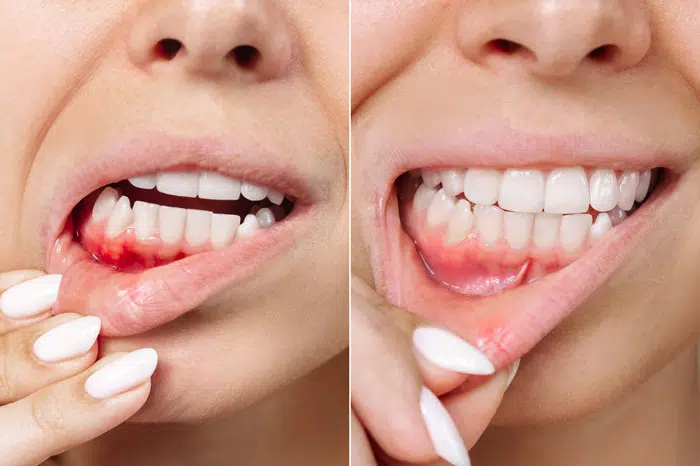Healed My Receding Gums
My unexpected battle with gum recession and my holistic path to restoring oral health.

Through research, lifestyle changes, natural remedies, and Dr. Corral's help, we found a way to heal my gums.
This is my story of resilience, hope, and the power of combining good oral hygiene and natural healing.
Common Causes of Gum Recession
First, I had to learn about what dental issues were causing my gums to recede.
Before going to see a dental professional, we found out the causes of receding gums is a common dental issue.
It occurs when the gum tissue surrounding the teeth wears away, exposing more of the tooth or its root. Several factors contribute to this dental health condition:
Symptoms and Diagnosis
-
Poor Oral Hygiene: Inadequate brushing and flossing can lead to plaque buildup, which hardens into tartar. This irritates the gums, causing them to recede.
My issue was I brushed and flossed rarely.
-
Aggressive Brushing: Brushing too hard or using a toothbrush with stiff bristles can wear down the enamel and push the gums away from the teeth.
This was not a major issue for me.
-
Gum Disease: Periodontal diseases caused by bacterial infections break down the gum tissue and supporting bone, leading to gum recession.
I went to Renew Family Dental to see Dr. Corral.
-
Genetics: Some people are naturally predisposed to gum recession, even if they maintain good oral hygiene.
My mother had dental problems most of her life.
-
Hormonal Changes: Fluctuations in hormones, particularly in women during puberty, pregnancy, or menopause, can make gums more sensitive and prone to recession.
The gum inflammation did start when I entered middle age.
-
Tobacco Use: Smoking or using other forms of tobacco can damage the gums and reduce their ability to heal, making them more likely to recede.
I did not smoke, but my mother did.
-
Teeth Grinding: Clenching or grinding your teeth puts excessive force on the gums, which can lead to recession over time.
We determined I was not grinding my teeth.
-
Misaligned Teeth or Bite: When teeth do not come together evenly, too much force is placed on the gums and bone, causing them to recede.
We know my teeth had shifted, but it was minor.
The First Signs
The first signs of gum disease were red and swollen gums, especially around my gum line.
Over time, I noticed more and more bleeding from even gently brushing. We knew it was time to see a dentist, and that's when we found Dr. Corral.
Consulting with a Dentist
Making an appointment was easy and fast. We saw them right away, and the first consultation was free.
After visiting Dr. Corral, we determined the causes of my growing gum disease.
My Initial Diagnosis
Poor oral hygiene, genetic predisposition, and rarely cleaning my teeth caused my gum issues.
Having identified the causes of my receding gums, we were able to chart the best way forward.
Our focus was on prevention and effective treatment to ensure long-term oral health.

Exploring Treatment Options
Luckily for me, we determined that gum surgery was unnecessary at this time. However, we discussed in detail the consequences of not taking action.
If we continued without doing anything, the disease would cause a gingival recession, harmful bacteria buildup, exposed tooth roots, and eventually bone loss.
Combining these factors would lead to complete tooth decay and eventually full mouth restoration with dental implants.
Avoiding all this was my new reason for improving my dental care habits.
My Renew Oral Health Plan
Dr. Corral and his team set me up with a complete oral health plan to protect and improve my mouth's soft tissue.
Professional Dental Treatments
Step one was more dental cleaning appointments and exams. Instead of going to the dentist when I had an issue, we decided that going to Renew for cleanings four times a year was crucial to preventing future problems and maintaining my healthy teeth.
The first cleaning was tough. It was a deep cleaning that removed all the built-up plaque and calculus. Afterward, there was a period of healing.
Of course, more dental visits would not be enough. Dr. Corral also said better at-home habits were required to avoid expensive future dental treatments like gum graft surgery.
Natural and Home Remedies
First, I had to break my habit of not brushing enough and never flossing. Believe it or not, we set up reminders on my phone to do this. Now, I brush twice a day and floss at night.
Adding additional home remedies like antibacterial mouthwash and fluoride toothpaste helped. Overall, my gum care has been entirely different since starting treatment at Renew Family Dental and improving my at-home habits.
My Healing Regimen
Sharing is caring so please check-out the current healing regimen we are using below.
-
Gently brushing twice a day using a soft-bristled toothbrush.
-
Using dental floss tape. The tape is easier on my gums.
-
Dental Cleaning every three months.
One downside is four dental cleanings a year cost more, but it is a great investment for my overall gum health.
Daily Oral Hygiene Practices
Brushing habits need to be done at the correct times. Brushing every morning after breakfast and at night after dinner is best. Additionally, flossing at night removes any food just underneath my gumline.
Dietary Changes
Avoiding spicy foods and energy drinks like coffee has significantly helped lower gum irritation. Also, sour and citrus foods irritated, and bleeding gums became more common afterward.
Natural Remedies
Luckily, since I went to visit a dentist, my issues have not resulted in me trying other natural remedies like coconut oil, oil pulling, and green tea.
Substituting coffee for green tea is the only natural remedy that helped. Giving up coffee was tough, but worth it.
Professional Treatments I Avoided
Taking action before my case got too bad was a huge benefit.
By avoiding tobacco products, keeping dental appointments, and staying on top of my doctor's recommended oral care habits, more intensive dental treatments below were unnecessary at this time.
Professional Treatments I Avoided
Taking action before my case got too bad was a huge benefit.
By avoiding tobacco products, keeping dental appointments, and staying on top of my doctor's recommended oral care habits, more intensive dental treatments below were unnecessary at this time.
Results and Progress
The results have been excellent and better than expected.
-
Tooth sensitivity is virtually gone!
-
Eating and drinking are pain-free.
-
I can't stop smiling.
Improvements Noticed
Amazingly enough, I think my energy has increased. This might be just mental, but that still counts.
Feeling more energy isn't the only improvement. I always had problems with swelling from the top of my mouth to under my tongue. All that is gone. The roof of your mouth will also feel better.
Regular Check-ups and Maintenance
Going to the dentist was always painful and expensive. However, by going more often for regular check-ups, the pain of cleaning has been reduced dramatically.
Additionally, the cost of high-dollar treatments like scaling and root planing or gum flap surgery is now unnecessary because patients visit Dr. Corral more frequently.
Paying for four dental visits a year has helped avoid high-cost surgeries.
Tips for Preventing Gum Recession
Follow these simple steps to avoid gum recession.
Proper Brushing Techniques
-
Brush at a 45-degree angle
-
Brush for at least 2+ minutes
-
Use gentle brushing techniques
Using the Right Dental Products
-
Tape dental floss can be gentler
-
Use mild, non-caustic mouthwash
-
Rise using warm saltwater
Routine Dental Visits
-
Visit the dentist more often
-
Two dental visits a year is the minimum
Healing Gums Conclusion
In conclusion, taking better care of my mouth has been life-changing. The first step was to visit Dr. Corral. He and his dental team helped me develop a plan to feel better, have no bleeding, and avoid expensive gum treatments.
My Advice to Others
Don't wait or ignore discomfort issues in your mouth or bleeding in the gums. See a dental professional as soon as possible.
Make an appointment with Renew Family Dental to restore your oral health.
Dr. Anthony Corral Post Author
Anthony R. Corral, DMD received his undergraduate degree from Johns Hopkins University in Cellular/ Molecular Neuroscience and continued his education at Temple University where he received Doctor of Dental Medicine. Active membership in the American Dental Association, Florida Dental Association, & Academy of General Dentistry.


